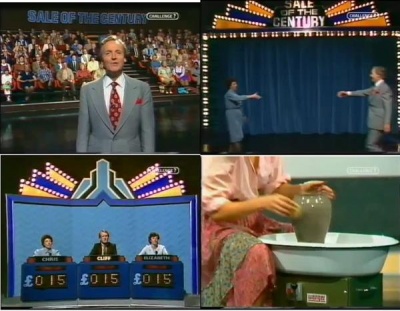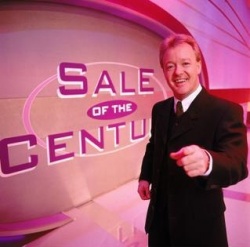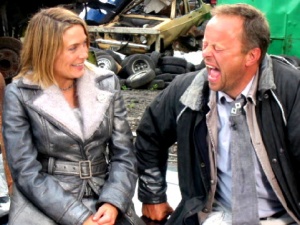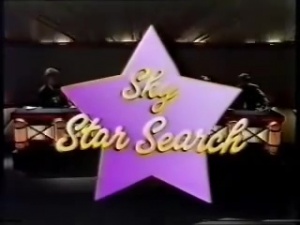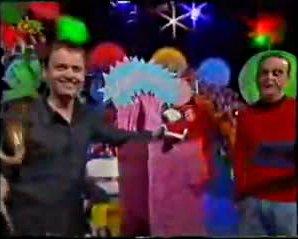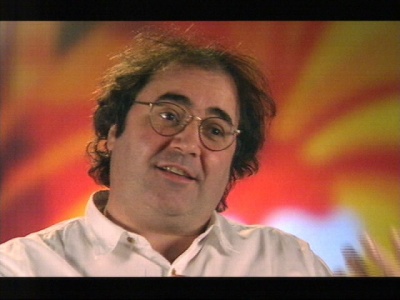Weaver's Week 2024-11-03
(Created page with 'Last week | Weaver's Week Index | Next week Once more into the game shows with lots of episodes. We'r…')
Newer edit →
Revision as of 10:17, 3 November 2024
Last week | Weaver's Week Index | Next week
Once more into the game shows with lots of episodes. We're counting shows with 100 distinct primetime episodes, or 500 episodes in total. As we near the end of the project, and to increase the tension to almost detectable levels, we'll not publish a consolidated list until our A-to-Z has reached Z.
This week: Oddments Reduced!
Contents |
Which game shows have had the most episodes? Part 16: SAL-SPO
Second take Two matters arising.
We incorrectly calculated the number of episodes of Raven: the accurate total is 296. (And, yes, we've checked that the 30-minute edits of Fitheach contained no competition that hadn't previously been shown in the 10-minute versions; there may be some filler shots of landscape.)
Looks Familiar was a spin-off from Sounds Familiar, the radio show. 167 radio episodes from 1967 to 1974; this doesn't elevate the format into our big lists.
Sale of the Century
From Norwich! It's the quiz of the week, the Sale of the Century. Invented by Al Howard (who we'll meet again next time), and popularised in Australia as Temptation, the show became indelibly associated with Nicholas Parsons.
The basic idea is that all the prizes had been "discounted" to absurdly low prices (normally about 10% of the stated full price). Three contenders answer questions, they're rewarded with cash for each correct answer, lose dosh if they get anything wrong. From time to time in the game there'd be "bargains" displayed which the contestants could buzz in for and buy with some of their cash. The contestant with the most money when the gong sounded at the end would go into the titular sale, where they could spend the money they'd earned on the big prizes.
The prizes were big: the winner should be able to get a dining room suite, or the star prize of a car. Any player could pick up patio furniture, a vacuum cleaner, or a weekend trip to Paris. The host became a star, thanks to his no nonsense approach to the quiz: viewers were here to see big winners, not Nick Parsons mucking about. At the end, Nicholas would read questions as fast as his tongue could allow, and with a great quizzer on the panel to get them right he could set the record for fastest quiz host on the telly.
After coming off ITV in 1983, the series was revived for Rupert Murdoch's new-look The Satellite Channel, and Keith Chegwin hosted a couple of series for the Challenge channel.
The ITV run had 411 episodes; as all were shown in primetime by Anglia television, we're going to call them primetime. Three series on The Satellite Channel appear to have amassed 400 episodes of consumerism, before they figured The Simpsons would be more popular. Difficult to pick out the length of the Challenge channel series; we think 50 episodes in each series, but this could be an over-estimate. And there was one episode in Gameshow Marathon.
That all adds up to 912 primetime episodes.
Scavengers was the show of the future. John Leslie guides a group of fit yuppies around an abandoned starship that just happens to be in a studio near London. Watch it with a bit of a wry eye and lean into the silliness, and it's thoroughly entertaining telly. Watch it at face value and it is overblown self-indulgent tosh. Relegated from Saturday evening to that oh-so-important 9.25 slot on Monday morning. 13 episodes.
We've not managed to fully research School Challenge (previously Ulster Schools Quiz). What we have found is that it ran at Saturday lunchtime for about 15 weeks a year, from about 1983 to 1992; the BBC revival in 1999 has fallen into a digital black hole. We're reasonably confident that this show didn't reach our requirement of 100 primetime episodes or 500 in total.
Science Fair '66 – later called Young Scientists of the Year – ran on BBC2 from 1966 to 1981. A total of 92 primetime episodes.
Scrapheap Challenge
Kryten from Red Dwarf lives on a rubbish dump. Every so often, he gets visitors, and invites them to make something useful out of his discarded bits and bobs. Buggies and catapults and Gatling guns and diving bells and remote control cars and everything.
Surprised us with how watchable it was – entertaining contestants, lots of camaraderie, and some actual technical knowledge sneaks into the show. Editing helps: twenty hours of construction was chopped down to about half-an-hour on screen, so they're able to come out with a proper story.
And if the welding and banging didn't interest, the final part was the test. Will their catapult actually fling anything? Is their diving bell waterproof? Can their remote control car be controlled? At least once a series, a construction went "ploff".
The main series had 156 primetime episodes, plus 20 specials. Spin-off series Scrappy Races had 14 episodes in its three runs. We're sure there was muttering about a revival a few years ago, and it would be welcome. 190 primetime episodes.
Screen Test was a quiz about film for children; mostly observation of what had just happened, but a little knowledge of Hollywood stars and Disney animations helped. Also included Young Film Maker of the Year. 232 episodes, plus 11 non-competitive shows offering tips for Young Film Makers.
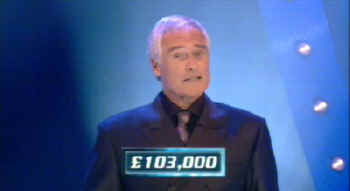 You're off the show.
You're off the show.Shafted does not make the long list. Robert Kilroy-Silk from Kilroy! fronted a show of half questions, silly arguments based on no evidence whatsoever, the constant threat of the show degenerating into a mass brawl, and a massive disappointment at the end. He also presented Shafted, which was taken off air a mere four episodes into its run. One newspaper critic wondered if the devisor later went on to dream up "How to Fill in Your VAT Return".
...which was the sort of simple topic they covered in The Shiny Show. Tigs, Mukka, and Richard Park asked each other questions, to which a correct answer was rewarded with a shiny. 91 episodes, repeated endlessly on Cbeebies for about ten years.
Shipwrecked took sixteen young people, stuck them on an island in the south Pacific, saw what happens. After three series of an observational documentary, they added a competition element – tribes compete to attract the attention of a newcomer, and the tribe with the most members at the end is the winner. A total of 153 episodes, but the first 38 were not competitive, and the show wasn't in primetime for its 2006 series. That leaves just 95 primetime episodes, not enough for the final lists. There's probably a revival planned as we speek.</div>
Shooting Stars had about twenty gazillion catchphrases, generated sixty squillion laughs, and all from 72 primetime episodes.
Sky Star Search
...or Cheggers says, "Here's a bit of talent". From the early days of KYTV, before they'd discovered that The Simpsons was the only entertainment programme worth watching.
There was an open door policy: anyone who wanted to be on it could be on it, which explains why the judging panel would include professional bloviator James Whale, and Lacivia from the KYTV Dish Dollies. The acts were rarely better than the panel, and once the producer started recording, he wouldn't stop even if a herd of wildebeest stampeded through the studio in single file.
Went out every weeknight from February 1989 to July 1990, with one final series in summer 1991. 424 primetime episodes, precisely no stars found, so a bit like The Voice.
The Sky's the Limit
Travel-themed variation on Hughie Green's earlier hit Double Your Money, with contestants answering questions on geography with the prize holiday getting more impressive the more they got right. The top prize was 21,000 miles and £600 spending money. Ran for four years in the early 1970s, ended when oil and air travel got really expensive. Just two episodes survive in the archives out of 169 primetime episodes made.
SM:TV Live
The warm-up show for CD:UK, except that designation lasted about as long as Phil Swern in "Doctor Pop" guise. Quickly turned into a series of sketches, competitions, letters, cartoons, and bits of silliness. Hosts Ant McPartlin, Declan Donnelly, and Cat Deeley turned into major stars.
Took a bit of time to get going – original producer Ric Blaxill (fresh from Top of the Pops) had a bit too much of a fixed idea, and didn't make changes when the viewers rejected the show and watched Zoe and Jamie on Live & Kicking instead. With a full year contract to see out, the easiest option was to ditch the producer, give the hosts their head, and lean into their improvisational skills. Enter ideas like Dec Says, the Poké-Rap, and top sitcom Chums.
And there were games: Splatoon, phone-in viewers guide the hosts to shoot down water balloons; the name's since been nicked by some computer game that doesn't feature Ant and Dec dressed as 1930s aviators and hence is completely bobbins. Challenge Ant, a child tries to prove they know more about showbiz and general knowledge than Ant McPartlin, complete with cries of "You're thick, you're thick, you're thick you are" when the youngster succeeds.
And the greatest of them all, Wonkey Donkey: an animal is in some sort of unusual position, with the task to identify the creature and what it's doing – and it's got to rhyme! We're going to count this as a game show, because the best-remembered bits are Challenge Ant, the Poké-fun, Wonky Donkey, and the general air of carefully-controlled anarchy.
Went downhill after Ant and Dec made Slap Bang, which was basically SM:TV in primetime and so we're going to count it here (and not with Ant and Dec's subsequent Takeaway). 279 episodes in the morning, 6 Slap Bang eps, and one best-of documentary in 2020. That's a total of 286 episodes.
Spellbound
Paul Coia invites contestants to uncover words on a bank of televisions. Answer trivia questions to uncover letters, and perhaps link them to make words for lots of points. Included an early 0898-gate mechanic, where the viewer at home could ring in and win £1000 and a KYTV mug from Sofa Shop ("you spend – we send!")
185 primetime episodes; because it went out on satellite telly in the mid-90s, nobody remembers it.
Spin Star Bradley Walsh tries to give away lots of money on daytime ITV, by asking questions and (er) spinning a giant fruit machine. 30 episodes, and not renewed because Bradley found something more popular to host.
Sporting Chance was a radio quiz about sport. Originally a knockout quiz between teams from "the new towns". Then it became a competition between a resident team (Maurice Edelston, Peter West, Alun Williams) and teams representing other places – basically Round Britain Quiz with a sporting lean. Then it evolved into a schools' quiz, before returning into a travelling panel quiz again. There was a television version in Grandstand, and a short-lived Junior version. Revived in 1973 as a knockout contest, and in 1974 with a series recorded on army bases in West Germany. Revived again on Tyne-Tees in 1983. We find 183 episodes.
Sportscall was the apogee of phone-in entertainment. Even if you knew nothing about sport, you'd be blown away by Danny Baker's sheer enthusiasm, and later by Dominik Diamond's glorious dry wit. Ran from 1990 to 2000, and eventually succeeded by Fighting Talk. 447 episodes.
And with Mark Pougatch tapping his watch, we'll take our leave of you here. Next week: shows beginning Spy, Star, Step, and a couple of very big programmes indeed.
In other news
Oliver Ashmole-Day has died. He was a television archivist, and generously digitised and uploaded masses of old video cassettes to the Ashmole-Day Collection on Youtube. Plenty of game shows, and so much continuity to show how programmes were advertised to viewers. He is survived by his husband Steve.
Not a repeat, honest ITV aired a new episode of Tipping Point Lucky Stars last weekend, with Claire from Steps and Owain from Strictly. One of the questions asked "Who did the BBC jury give 12 points at Eurovision to?" Crikey, that's got us thinking. Er, um, "The code" wasn't it?
But the question continued, "… in 2022?" Blimey! Two full years ago? How long has this episode been sat on a dark shelf at ITV Towers? Did the charities get their money when it was recorded, or this eternity later? ("Hold me closer" the answer, well done if you got that at home.)
Quizzy Mondays
Who would have thought that Ceefax would play a crucial role on Mastermind? Justin Lee got a question about the teletext service; he's a student who we think was at primary school when it ended in 2012. Not knowing the best way the Beeb has ever displayed news left Justin in a tie with Lewis Jones, who won the tiebreak 4-2. Lewis had actually had a nightmare specialist round, scoring just five on the films of David Fincher. We cannot remember a lower score coming through to win a heat. The spectacular general knowledge score, and snappy approach, suggests Lewis could be one to watch in the semis.
Uisge Beathas continued in Only Connect, beating the Third Agers by 32-22. From a mention of the M45 in the opening question, through a throwback to a joke in a team's prior episode, to some very careful playing of the wall to find the right Hackney connection. Laborious explanation of the night was a sequence asking for triples of musical notes; that makes sense when we see it for facts shared by pairs of numbers.
Edinburgh beat Leeds by 175-125 on University Challenge. Very much a game of three parts: Edinburgh raced to a 125-35 lead, had it pegged back to 140-125, only to pull away again in the final few minutes. Lots of arts and entertainment questions this week, which Edinburgh did very well; next-to-no questions we could class as geography or history. Edinburgh's bonus rate of 64% is decent, the overall mark of 56% is rather weak for a heat winner.
To nobody's surprise, Durham have qualified for the repechage, with their score of 165 against Oriel Oxford. Leeds become the third losing team with a score of 125, joining UEA and Liverpool. The statistics suggest Liverpool remain in contention, they have 54% bonuses and 46% overall, against UEA's 52% bonuses 42% overall, and Leeds' 42% bonuses 39% overall. We'll discuss these stats further once the first round concludes.
Hello to Junior Taskmaster (C4, Fri). For weekdays, Antiques Road Trip returns (BBC1), with Celebrity Antiques Road Trip also kicking off (BBC2, Wed). New run of The Rap Game (BBC3, Tue). Next Saturday has Richard Osman on The Wheel, Richard Bacon on The Chase, and Jonathan Ross on Parents' Evening. Hope he'll show us his collection of moss.
To have Weaver's Week emailed to you on publication day, receive our exclusive TV roundup of the game shows in the week ahead, and chat to other ukgameshows.com readers, sign up to our Google Group.

